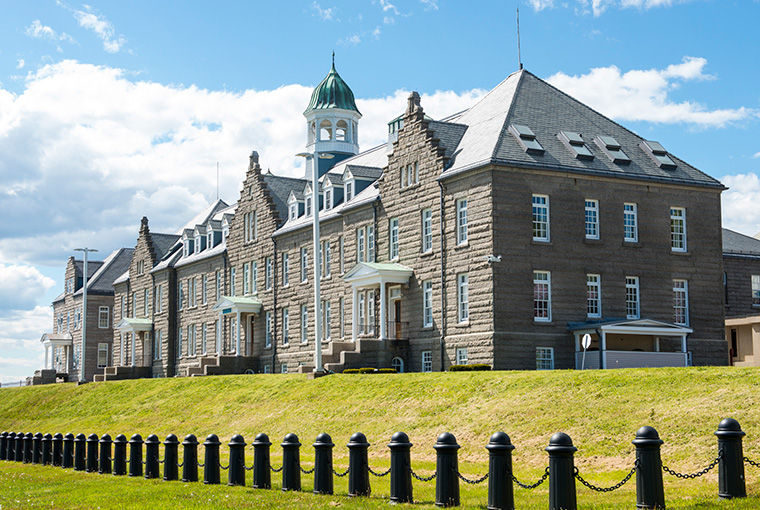U.S. Naval War College Co-Hosts First Conference on Oceans Law and Policy in Latin America

Newport, R.I. - The U.S. Naval War College’s (NWC) Stockton Center for International Law (SCIL), the Ministry of Foreign Affairs of Peru and World Maritime University (WMU) Sasakawa Global Ocean Institute co-hosted the 47th iteration of the Conference on Oceans Law and Policy (COLP), a presentation series on ocean-related legal and public policy issues, at the Peruvian Naval Academy in Lima, Peru, Sept. 17-20.
This year’s COLP, the first in the series to take place in Latin America, was titled “Ocean Governance in the South Pacific and Latin America.” The conference examined the historical contributions of Latin America to the law of sea and ocean governance and generated discussion on current challenges and opportunities in the South Pacific region.
In his welcoming comments, Adm. Luis José Polar Figari, Commander in Chief of the Peruvian Navy, stressed the importance of a stable ocean regime for Peru’s national and economic security and expressed his appreciation to the organizers of COLP for choosing Peru as the first State in Latin America to host the conference.
Raul “Pete” Pedrozo, SCIL’s Howard S. Levi Chair of the Law of Armed Conflict, also welcomed the audience, underscoring the critical importance of regional maritime security.
“Peru was instrumental in advancing oceans governance with the 1952 Santiago Declaration, which is reflected in the United Nations Convention on the Law of the Sea. As we face challenges from Houthi attacks on international shipping to the South China Sea, it is fitting that we explore oceans law from the vantage point of Lima,” Pedrozo said.
The event assembled a global audience of more than 560 virtual and in-person attendees representing nonprofit organizations, academic institutions, civil societies, international and regional organizations, key stakeholders from various ministries, representatives of the United Nations and media.
Conference attendees participated in panels supported by more than 30 speakers, discussing international laws applicable to biodiversity; plastic pollution treaty negotiations; sustainable fisheries and marine environmental protection; maritime safety and security; decarbonization of shipping and climate change; emerging technologies and digital connectivity; ocean governance, human rights, and non-state actors; and national laws and policies.
“NWC is honored to join with the Peru Ministry of Foreign Affairs, the Peruvian Navy, and a dozen other institutions globally to advance the international rules-based order,” said James Kraska, S.J.D., chairman and Charles H. Stockton Professor of International Maritime Law at NWC’s SCIL at the end of the conference. “From countering illegal fishing to developing norms for seabed mining, the conference is a major platform for crafting rule of law in the oceans.”
Conference findings will be published in an open-access book under the conference subtitle, with support by the Japan Institute for International Affairs.
The WMU-Sasakawa Global Ocean Institute was inaugurated in May 2018 and is an independent focal point working at the interdisciplinary interface between science, industry, policy, ocean governance and law. Faculty, staff, and students at the Institute undertake challenge-led and evidence-based research, as well as educational and capacity-building training with a particular focus on implementing various goals, including Life Below Water, Gender Equality, and Climate Action under the 2030 Agenda for Sustainable Development.
Headquartered in Lima with decentralized offices (ODE) in 13 regions, the Ministry of Foreign Affairs of Peru represents Peru internationally, providing services to Peruvians abroad through a network of Foreign Service Bodies (OSE) made up of 65 embassies, 69 Consulates, and 14 Permanent Representations to international organizations, such as the United Nations and the Organization of American States. Its areas of expertise are international relations, foreign policy, and international cooperation.
NWC’s SCIL operates within the Center for Naval Warfare Studies (CNWS), a globally recognized research institute producing original research and analysis of both international law and military operations. Its work is targeted to military leaders, national decision makers, and international law practitioners and scholars.
Established in 1884, NWC is the oldest institution of its kind in the world. The college delivers excellence in education, research, and outreach, informing today’s decision makers, educating tomorrow’s leaders, and engaging partners and Allies on all matters of naval power in order to preserve the peace, respond in crisis, and win decisively in war.
